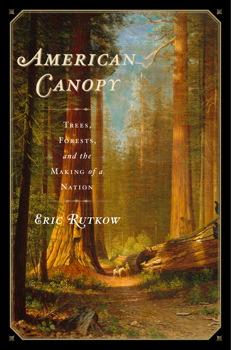Rutkow, Eric. American Canopy: Trees, Forests, and the Making of a Nation. New York: Scribner, 2012.
As Eric Rutkow’s brilliant, epic account shows, trees were essential to the early years of the republic and indivisible from the country’s rise as both an empire and a civilization. Among American Canopy’s many fascinating stories: the Liberty Trees, where colonists gathered to plot rebellion against the British; Henry David Thoreau’s famous retreat into the woods; the creation of New York City’s Central Park; the great fire of 1871 that killed a thousand people in the lumber town of Peshtigo, Wisconsin; the fevered attempts to save the American chestnut and the American elm from extinction; and the controversy over spotted owls and the old-growth forests they inhabited. Rutkow also explains how trees were of deep interest to such figures as George Washington, Thomas Jefferson, Benjamin Franklin, Teddy Roosevelt, and FDR, who oversaw the planting of more than three billion trees nationally in his time as president. As symbols of liberty, community, and civilization, trees are perhaps the loudest silent figures in our country’s history. America started as a nation of people frightened of the deep, seemingly infinite woods; we then grew to rely on our forests for progress and profit; by the end of the twentieth century we came to understand that the globe’s climate is dependent on the preservation of trees. Today, few people think about where timber comes from, but most of us share a sense that to destroy trees is to destroy part of ourselves and endanger the future. — Simon & Schuster website.


